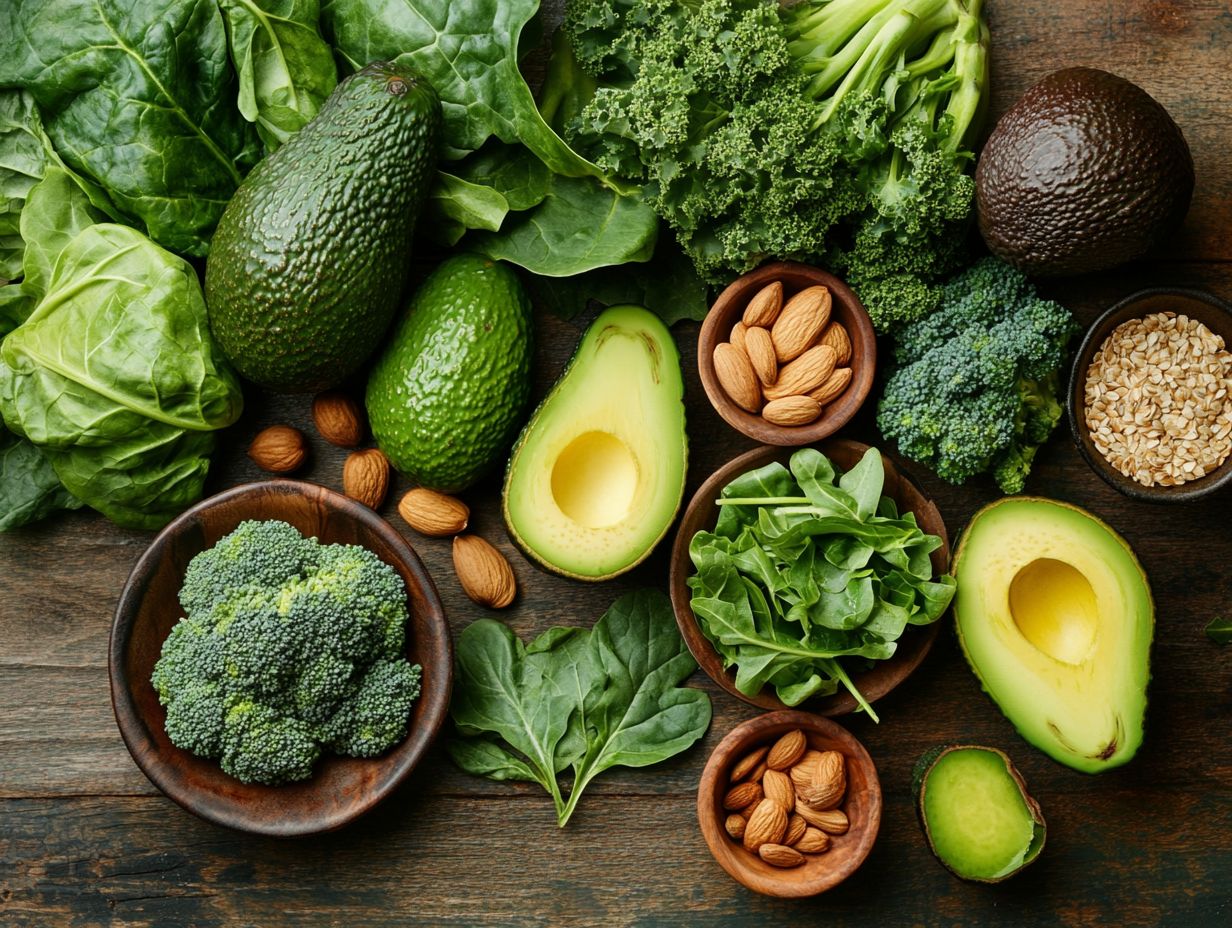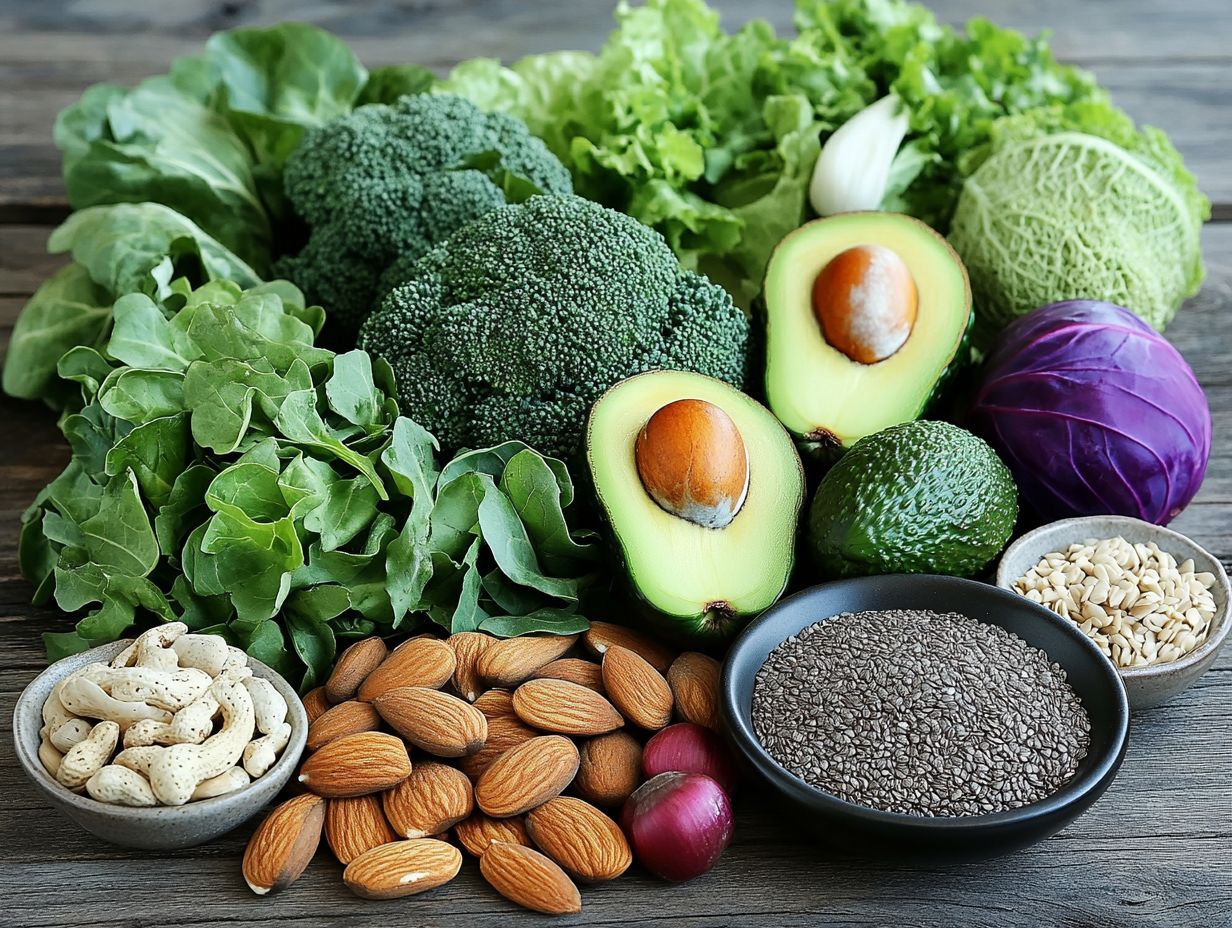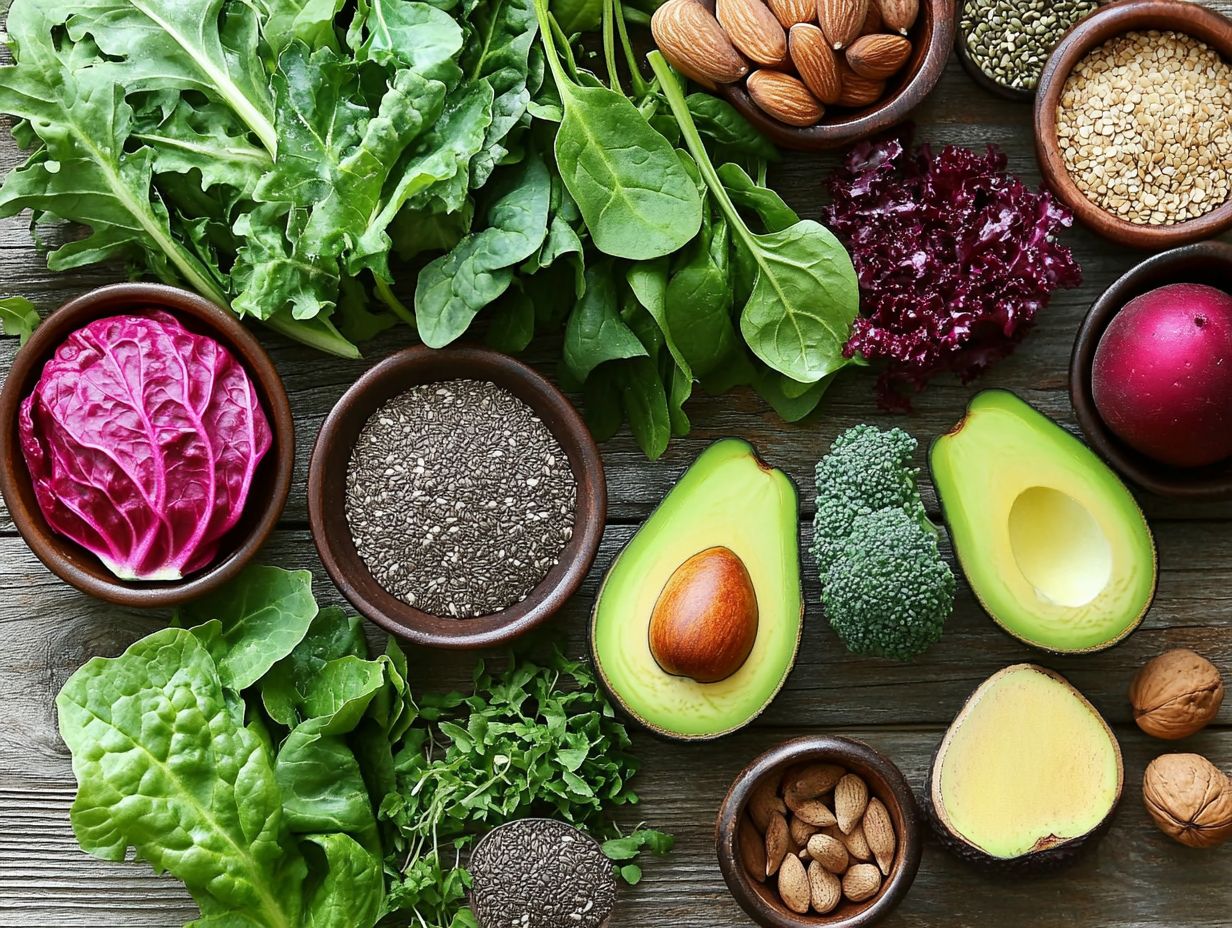Keto and Nutritional Diversity: Why It Matters
The ketogenic diet is taking the wellness world by storm! Celebrated for its potential to promote weight loss and enhance mental clarity, it s essential to consider its impact on nutritional diversity, which is frequently overlooked. While keto emphasizes high fats and low carbohydrates, it can inadvertently lead to nutrient deficiencies if not approached with care, particularly regarding key vitamins and minerals.
In this article, you will explore the essentials of nutritional diversity within the context of the keto diet. You’ll learn about its significance for overall health, the potential risks of a limited variety of foods, and practical tips for incorporating a wide array of nutrients into your meals. We will also explore how you can integrate practices like intermittent fasting with the ketogenic diet to support overall well-being.
Discover how to skillfully balance the principles of keto with a diverse nutrient intake to achieve optimal well-being and avoid issues such as the keto flu.
Contents
- Key Takeaways:
- What is the Keto Diet?
- What is Nutritional Diversity?
- Why is Nutritional Diversity Important for Overall Health?
- How Does the Keto Diet Affect Nutritional Diversity?
- What Nutrients are Often Lacking in a Keto Diet?
- What are the Risks of Not Having Nutritional Diversity on a Keto Diet?
- How Can You Incorporate Nutritional Diversity into a Keto Diet?
- 3. Try New Keto-Friendly Foods and Recipes
- What are Some Tips for Maintaining Nutritional Diversity on a Keto Diet?
- 1. Plan Meals in Advance
- 2. Track Nutrient Intake
- Frequently Asked Questions
- 1. What is the keto diet and how does it promote nutritional diversity?
- 2. How does nutritional diversity benefit the body while on a keto diet?
- 3. Can a lack of nutritional diversity on a keto diet lead to health issues?
- 4. How can individuals incorporate nutritional diversity into their keto diet?
- 5. Can nutritional diversity be achieved on a vegetarian or vegan keto diet?
- 6. Is it important to monitor nutritional diversity while on a keto diet?
Key Takeaways:

- Incorporating a variety of non-starchy vegetables is essential for maintaining nutritional diversity on a keto diet.
- Nutritional diversity is important for overall health as it helps prevent nutrient deficiencies and chronic diseases.
- Planning meals in advance, tracking nutrient intake, and consulting a registered dietitian can help maintain nutritional diversity on a keto diet.
What is the Keto Diet?
The keto diet, or ketogenic diet, is a high-fat, low-carbohydrate eating plan that aims to shift your body s metabolic state into ketosis, a state where the body burns fat for energy instead of carbohydrates. This metabolic shift produces ketone bodies, which provide an alternative energy source.
Embracing this dietary approach not only facilitates weight loss by burning body fat but also presents a range of health benefits acknowledged by esteemed institutions like the Cleveland Clinic. By significantly reducing your carbohydrate intake, you can stabilize insulin levels, enhance energy efficiency, and even support better diabetes management. Research also suggests potential benefits for managing chronic illnesses like metabolic syndrome, epilepsy, and Alzheimer’s disease.
What is Nutritional Diversity?
Nutritional diversity is all about embracing a wide array of foods to ensure you re getting a balanced intake of essential nutrients, including vitamins, healthy fats, proteins, and carbohydrates. This concept is crucial for maintaining optimal health, as it supports your body s various functions and helps cultivate a balanced gut microbiome, teeming with diverse bacterial species like Bacteroidetes and Firmicutes. It is also vital for maintaining healthy blood sugar levels and body weight.
It significantly reduces the risk of chronic diseases. The importance of incorporating a broad spectrum of foods into your diet is paramount, especially if you find yourself on restrictive diets such as keto. Consulting with a healthcare provider can offer personalized guidance to help you maintain nutritional diversity while following a keto regimen.
Don’t wait until deficiencies hit start diversifying your meals today!
Why is Nutritional Diversity Important for Overall Health?
Nutritional diversity is essential for your overall health. It ensures that your body receives a broad spectrum of essential nutrients vital for effective metabolism, immune function, and disease prevention.
Eating a variety of foods rich in vitamins and minerals helps establish a resilient immune system capable of combating chronic illnesses while maintaining optimal bodily functions. This diversity is also key to fostering good mental health and emotional well-being, both of which are intricately linked to physical health outcomes and can potentially reduce the impact of anxiety and depression.
By incorporating a wide range of food groups fruits, vegetables, whole grains, lean proteins, and healthy fats you equip your body with an array of antioxidants and phytochemicals that work in harmony to enhance your overall health. For example, the omega-3 fatty acids found in fish and nuts can help reduce inflammation, while B vitamins play a crucial role in supporting brain function and energy levels.
Research indicates that individuals who embrace a diverse diet are less likely to experience anxiety and depression, underscoring the profound connection between what you eat and how you feel. Therefore, diversifying your nutritional intake serves as a proactive measure to fend off chronic diseases like heart disease and diabetes, making it a cornerstone of a healthy lifestyle. Nutritional ketosis, which is a metabolic state where the body uses fat for fuel instead of carbohydrates, should be managed carefully to ensure it supports rather than detracts from overall nutritional diversity.
How Does the Keto Diet Affect Nutritional Diversity?
The keto diet profoundly influences your nutritional diversity by limiting carbohydrate intake to induce ketosis, narrowing your food choices. While this low-carbohydrate method can offer health benefits like weight loss and enhanced glucose levels, it also carries the risk of nutrient deficiencies if not managed thoughtfully. Engaging in intermittent fasting alongside the keto diet may compound these effects if nutritional diversity is not adequately prioritized.
To achieve a balanced intake, it s essential for you to be strategic in incorporating a variety of food sources that deliver essential vitamins, healthy fats, and proteins. By doing so, you can maintain a level of nutritional diversity that supports your overall well-being, even while keeping your body in a state of nutritional ketosis.
What Nutrients are Often Lacking in a Keto Diet?
A common concern you might encounter with the keto diet is the potential lack of certain nutrients due to the drastic reduction in carbohydrate intake. This can lead to deficiencies in essential vitamins and minerals. Key nutrients often found to be lacking in those adhering strictly to a keto regimen include magnesium, potassium, and sodium crucial elements for maintaining electrolyte balance and overall well-being. Managing your intake of these nutrients is essential to avoid the common issue known as keto flu.
Vitamins that usually come from fruits, vegetables, and whole grains may be lacking, making careful planning essential to ensure you meet your nutritional needs.
To tackle these deficiencies, you can thoughtfully incorporate foods rich in these nutrients into your meals. For example, leafy greens and avocados serve as outstanding sources of potassium and magnesium, while nuts and seeds provide both minerals along with a healthy dose of fats. Adding bone broth to your diet can also help naturally replenish sodium levels. This strategic approach will empower you to achieve your health goals while ensuring that your ketogenic diet supports both weight loss and nutritional health.
It s wise to consider supplements for vitamins A, C, and K, as these may be less readily available within a keto framework.
By adopting this strategic approach, you can maintain the desired ketogenic state without compromising your nutritional health.
What are the Risks of Not Having Nutritional Diversity on a Keto Diet?

Are you getting the nutrients your body craves? Neglecting nutritional diversity while following a keto diet can expose you to a host of health risks. These include nutrient deficiencies, chronic diseases, and adverse effects on gut health. Eating a balanced mix of vitamins, minerals, and nutrients can help reduce these risks.
When you limit your food choices excessively, you risk missing out on essential vitamins and minerals crucial for your body’s optimal function. This can weaken your immune system and jeopardize your overall well-being, potentially leading to chronic illness.
A lack of variety can disturb the balance of gut bacteria, leading to digestive issues and long-term health repercussions. Consuming a range of foods helps support a balanced gut microbiome and overall digestive health.
1. Nutrient Deficiencies
Nutrient deficiencies pose a significant risk for anyone following a keto diet, especially if you don t prioritize nutritional diversity in your meal planning. You might lack essential nutrients like vitamins A, C, and K, as well as vital minerals such as magnesium and potassium. These are all crucial for optimal metabolic functions and overall health. Such deficiencies can lead to various issues, including a weakened immune system, fatigue, and impaired metabolic processes.
To counter these risks, it s essential to incorporate a variety of nutrient-dense foods into your ketogenic lifestyle. For example, leafy greens like spinach and kale are packed with essential vitamins and minerals. Fatty fish, such as salmon, can enhance your omega-3 fatty acid intake. Nuts and seeds, including almonds and chia seeds, provide excellent sources of magnesium to help maintain your levels.
Don t forget avocados! They not only add healthy fats but also boost your potassium intake. By emphasizing a holistic approach to your dietary choices, you can effectively mitigate the potential deficiencies that come with limiting carbohydrate intake. Consulting a healthcare provider can also provide additional strategies to maintain a balanced diet.
2. Increased Risk of Chronic Diseases
A lack of nutritional diversity on the keto diet can significantly elevate your risk of chronic diseases. When you don’t get enough essential nutrients, your overall health and metabolic function can suffer. Chronic conditions like metabolic syndrome, diabetes, and cardiovascular issues can arise from an unbalanced diet that fails to provide necessary vitamins and minerals. This connection between diet and disease highlights the importance of incorporating a varied selection of foods, even within a low-carbohydrate framework.
Research shows that diets lacking variety often lead to deficiencies in critical micronutrients, which are essential vitamins and minerals your body needs in small amounts. Experts suggest that your plate should be colorful, featuring leafy greens, nuts, and seeds to ensure a balanced intake of antioxidants and fatty acids. Skipping these can not only increase your risk of chronic conditions but also exacerbate any existing health problems.
Furthermore, studies indicate that individuals who strictly adhere to limited ranges of keto-friendly foods may often overlook fiber. Fiber is a key player in gut health, leading to further complications. Embracing a wider array of low-carb options is crucial for anyone following this dietary pattern. This approach ensures you receive all the necessary nutrients to support your long-term well-being. Consulting with a registered dietitian can also provide personalized strategies to improve your nutritional diversity.
3. Negative Effects on Gut Health
The negative effects on gut health that can arise from a lack of nutritional diversity in a high-fat diet like the keto diet are significant. This disruption can potentially lead to bloating, constipation, and heightened inflammation, disrupting the delicate balance of your gut microbiome, which is essential for maintaining good digestive health.
Since your gut microbiome includes Bacteroidetes and Firmicutes, it plays a critical role not only in digestion but also in overall immune function and mental health. Thus, emphasizing the incorporation of a variety of nutrient-dense foods is essential.
For those pursuing a keto lifestyle, it s vital to introduce low-carb, fiber-rich options like:
- Avocados
- Leafy greens
- Nuts
These foods can offer prebiotics that support the growth of beneficial bacteria. Incorporating fermented foods such as kimchi, sauerkraut, and yogurt can help replenish your microbiome with healthy strains, promoting a well-balanced digestive system while still adhering to ketogenic diet principles.
How Can You Incorporate Nutritional Diversity into a Keto Diet?
Want to supercharge your keto diet? Incorporating nutritional diversity is the key to achieving a well-rounded intake of nutrients while keeping those low-carbohydrate guidelines. By thoughtfully planning meals that feature a range of non-starchy vegetables, healthy fats, and quality proteins, you can elevate your nutrient profile without straying from your low-carbohydrate diet objectives.
This strategy not only bolsters your metabolic health but also guarantees that your body receives the essential vitamins and minerals it needs for peak performance.
1. Include a Variety of Non-Starchy Vegetables
Incorporating a variety of non-starchy vegetables is essential for achieving nutritional diversity on your keto diet. These vegetables are low in carbohydrates yet high in vital vitamins and fiber.
Foods like spinach, kale, broccoli, and bell peppers not only boost your nutrient intake but also promote gut health and provide antioxidants that support your immune function. By diversifying your vegetable choices, you can meet your daily nutritional needs while adhering to keto guidelines.
Consider exploring options like zucchini, cauliflower, and asparagus to elevate your culinary experience and spark your creativity in meal preparation.
- Zucchini is incredibly versatile; you can spiralize it into noodles, making it a fantastic substitute for traditional pasta without jeopardizing your carb count.
- Cauliflower can be your secret weapon, transforming into a delightful rice alternative or a creamy mash that satisfies those comfort food cravings.
- Asparagus brings a satisfying crunch to your plate and is loaded with vitamins A, C, and K, making it a tasty and nutritious addition to any meal.
Each of these choices not only enriches your meals but also delivers essential nutrients that support your overall health and wellness.
2. Incorporate Healthy Fats and Proteins

Boost your energy and well-being by incorporating a blend of healthy fats and proteins into your keto diet! These nutrients play a pivotal role in sustaining energy levels and overall well-being. Foods like avocado, olive oil, fatty fish, and nuts not only deliver the essential fats needed for ketosis but also provide valuable proteins that support muscle health and metabolic function.
By prioritizing a variety of these food sources, you can meet your nutritional needs while staying true to your dietary goals. Adding ingredients such as seeds, coconut oil, and grass-fed meats can further enhance the balance of omega-3 and omega-6 fatty acids vital for reducing inflammation and promoting heart health.
For example, you can effortlessly sprinkle almond or chia seeds on salads or blend them into smoothies for an extra crunch and nourishment. Similarly, choosing salmon or trout not only boosts your meals with protein but also introduces essential nutrients like DHA, which is critical for cognitive function.
Try these tasty additions in your next meal and experience the difference in your energy levels!
3. Try New Keto-Friendly Foods and Recipes
Exploring new keto-friendly foods and recipes is a fantastic way for you to enhance nutritional diversity while adhering to a low-carb diet. Ingredients like zucchini noodles, cauliflower rice, and almond flour can be creatively woven into your meals, making your diet enjoyable and nutritionally balanced.
By experimenting with different recipes, you can uncover a wealth of flavors and textures that align perfectly with your keto lifestyle while ensuring you receive a broad spectrum of nutrients.
Incorporating unique components such as avocado, coconut flour, and various seeds not only elevates the taste of your dishes but also enriches their nutritional value. Embracing a variety of proteins, like grass-fed beef or wild-caught fish, paired with seasonal vegetables, can significantly enhance your overall health.
Explore these options to maximize flavor and keep your meals exciting. Engaging in cooking techniques like roasting or grilling can make meal prep enjoyable. By stepping outside your usual ingredient repertoire, you can avoid monotony and unlock new culinary experiences that make adhering to the keto diet not only easier but also more fulfilling.
What are Some Tips for Maintaining Nutritional Diversity on a Keto Diet?
Maintaining nutritional diversity on a keto diet is entirely within your reach through thoughtful planning and mindful eating practices designed to ensure you re getting a balanced intake of essential nutrients.
By planning your meals in advance, tracking your nutrient intake, and consulting with healthcare providers, you can confidently explore a variety of food sources while still adhering to your low-carbohydrate goals. This proactive approach is crucial for achieving long-term dietary success.
1. Plan Meals in Advance
Planning your meals in advance is an essential strategy for maintaining nutritional diversity on a keto diet. It enables you to make intentional choices about your food intake, ensuring you get a range of essential nutrients.
By dedicating time to craft a weekly meal plan filled with a variety of keto-friendly foods, you can sidestep those last-minute decisions that often lead to repetitive meals and nutrient deficiencies. Incorporating a diverse array of healthy fats, proteins, and low-carb vegetables not only supports your state of ketosis but also guarantees that your meal options are both exciting and satisfying.
Utilizing tools like meal prep apps and grocery lists can streamline the planning process, allowing you to effectively track your macronutrients. Setting aside a specific day for meal prep can elevate your strategy even further, encouraging you to batch-cook meals and snacks, which makes it easier to adhere to the keto lifestyle.
Don’t shy away from experimenting with new recipes; this keeps your diet fresh and engaging, ultimately promoting adherence and enjoyment.
2. Track Nutrient Intake
Tracking your nutrient intake is a powerful strategy for maintaining nutritional diversity on a keto diet. By keeping tabs on your consumption of essential vitamins and minerals, you can ensure your meals are balanced and satisfying.
Utilizing apps or journals to log your daily food intake allows you to identify any gaps in your nutrition and adjust your meal choices accordingly while sticking to those low-carbohydrate guidelines. This habit not only promotes accountability but also heightens your awareness of your nutritional status.
By understanding the nutrients you consume, you can effectively prevent any deficiencies that may arise from the restrictive nature of the keto lifestyle. Employing tools like mobile applications, online calculators, or even straightforward spreadsheet templates can make this process remarkably easy.
These methods enable you to input your food choices effortlessly and provide valuable insights into your overall dietary patterns, helping you make informed decisions. For anyone following a specific dietary regimen, it’s crucial to regularly evaluate nutrient intake. This practice not only fosters better health outcomes but also enables you to navigate your keto journey with confidence and success.
3. Unlock the Secrets of a Successful Keto Diet by Consulting a Registered Dietitian
Consulting a registered dietitian can be a game-changer for you as you strive to maintain nutritional diversity on a keto diet. Their professional guidance is tailored specifically to your health needs and dietary goals, helping you navigate the complexities of the various ketogenic diet types while ensuring you receive a balanced intake of nutrients.
With their expertise, you can create personalized meal plans that not only support your health but also bring joy to your dining experience. Maintaining nutritional diversity may benefit conditions like Alzheimer’s disease.
This tailored approach allows you to explore a variety of foods that align perfectly with keto guidelines without feeling confined. A registered dietitian from the Cleveland Clinic can educate you on the importance of incorporating a wide range of high-quality fats, proteins, and low-carb vegetables, enhancing both the appeal and sustainability of your diet.
By assessing your preferences and lifestyle factors, dietitians can assist you in achieving your weight loss or management goals while fostering a deeper understanding of healthy eating habits. Such comprehensive support enables you to make informed choices, ultimately enhancing your overall well-being as you embrace the ketogenic lifestyle. This approach may lower your risk of Alzheimer’s disease.
Frequently Asked Questions

1. What is the keto diet and how does it promote nutritional diversity?
The keto diet is a low-carb, high-fat diet that focuses on consuming foods that are low in carbohydrates and high in healthy fats. By limiting carbs, the keto diet encourages individuals to incorporate a variety of rich nutrient foods into their meals to meet their nutritional needs.
2. How does nutritional diversity benefit the body while on a keto diet?
Nutritional diversity on a keto diet allows for a wider range of essential vitamins, minerals, and antioxidants to be consumed, supporting overall health and immune function. It also helps prevent nutrient deficiencies and promotes a well-rounded, balanced diet.
3. Can a lack of nutritional diversity on a keto diet lead to health issues?
Yes, a lack of nutritional diversity on a keto diet can lead to potential health issues. Consuming a limited variety of foods can result in nutrient deficiencies, digestive issues, and imbalances in gut bacteria, such as Bacteroidetes and Firmicutes, affecting overall health and well-being.
4. How can individuals incorporate nutritional diversity into their keto diet?
To promote nutritional diversity on a keto diet, individuals can focus on incorporating a variety of low-carb vegetables, healthy fats, and high-quality proteins into their meals. They can also experiment with new recipes and try different foods to diversify their diet, ensuring they maintain a healthy balance of gut bacteria like Bacteroidetes and Firmicutes.
5. Can nutritional diversity be achieved on a vegetarian or vegan keto diet?
Yes, nutritional diversity can be achieved on a vegetarian or vegan keto diet by incorporating plant-based sources of healthy fats, such as avocados, nuts, and seeds, along with low-carb vegetables and plant-based proteins like tofu and tempeh.
6. Is it important to monitor nutritional diversity while on a keto diet?
Yes, it is important to monitor nutritional diversity while on a keto diet to ensure that all essential nutrients are being consumed. This can be done by tracking food intake and nutrients using a food diary or a nutrition tracking app. Consulting with a healthcare professional or registered dietitian can also aid in monitoring nutritional diversity on a keto diet.






